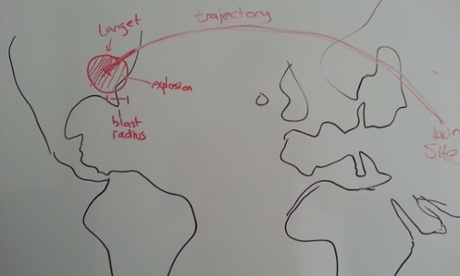
A British games developer’s letting agency called the police after mistaking diagrams of his new game for a planned thermonuclear attack on Washington.
Henry Smith is a software engineer from Bristol working on a game called “Global Thermonuclear War”, which uses Google Maps to simulate an atomic conflict between nations. Smith was planning out the game using whiteboards in his home when his letting agent made a pre-arranged visit.
A few days later, the agent rang, Smith says, and told him that “the person who did the inspection did have some concerns about one thing. There were some … whiteboards? And some … drawings on them?”
Although Smith believed he assuaged the agents’ fears by explaining that the sketches were plans for a game, he received a follow-up email the next week informing him that the matter had been referred to the local police.
“At first I was ridiculously frightened by the whole thing,” he told the Guardian. “When they said they’d told the police I absolutely bricked it. I ran home to check if the police had raided the house or something. It was definitely very frightening to think that the police had a report in their system alleging that I was up to something suspicious involving nuclear warheads. Knowing how the police here deal with suspected terrorists, I was worried they’d do a dawn raid or worse. It was genuinely scary for a while.”
The whiteboards in question show a grand circle trajectory between a “launch site” somewhere in the former USSR and a “target” on the US east coast. The “explosion” and “blast radius” are also marked on to the map, which was accompanied by two further whiteboards diagramming how various aspects of the game would work.
The police have not yet followed up the letting agent’s tip-off, and Smith now thinks they’re unlikely to, especially if they have seen photos of the diagrams. He says he doesn’t hold a grudge against the letting agency, who “just wanted to act responsibly”.
That is understandable, he says, “but their judgment has let them down for sure. Nobody is planning an intercontinental ballistic missile attack by Russia on Washington from a rented house in a Bristol suburb. And definitely not by drawing their missile trajectory freehand on a whiteboard.
“And even if they were, they wouldn’t have left those whiteboards out on the pre-agreed day of a visual inspection.”
A very early prototype of Smith’s game, which is little more than an animation of an ICBM trajectory, is now online at global.thermonuclearwar.org, but he confesses he’s not sure how the game progresses from here.
“The diagrams that got me in ‘trouble’ were an initial design for a sort of massively multiplayer ‘everybody just nuke each other’ sort of game. I thought it’d be pretty cool if there were a lot of people logged in and you could see which countries each player chose to nuke and how that changed with the ebb and flow of world news and international relations.”

